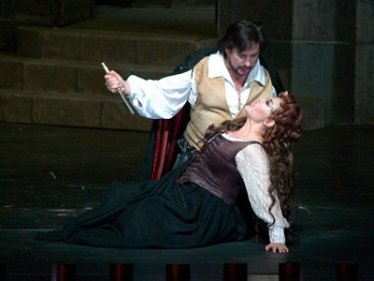La Gioconda - Schedule, Program & Tickets
La Gioconda
Dramma lirico in four acts;
Libretto by Tobia Gorrio (Arrigo Boito) based on the drama "Angélo, tyran de Padoue" by Victor Hugo;
First performance on April 8, 1876 at the Teatro alla Scala in Milan;
Premiered at the Deutsche Oper Berlin on March 1, 1974
recommended from 16 years
4 hours 45 minutes / Three breaks
In Italian with German and English surtitles
Introduction: 45 minutes before the start of the performance in the foyer on the right
The opera is set in seventeenth-century Venice. La Gioconda, a singer with a traveling troupe, loves the young nobleman Enzo, who in turn is in love with Laura, the wife of the inquisitor Alvise Badoero. The network of relationships is even more complicated by the intrigues of the spy Barnabà, who loves and desires Gioconda and tries by all means to win the singer over. Torn between her love for Enzo and caring for her old blind mother, who always travels with her, she gets caught in the web of hatred and passion that, starting from Barnabà, wraps itself ever tighter around her and the she eventually falls victim. After Enzo, who managed to flee with Laura after dangerous entanglements, has been stolen from her forever, Gioconda sees no way out. Barnabà, who already thought he had reached his goal, can no longer prevent her from ending her life.
Amilcare Ponchielli, born in Paderno Fasolaro near Cremona in 1834 and died in Milan in 1886, became famous above all as the composer of LA GIOCONDA, although he wrote twelve operas. Love, passion, hate - the story about the singer Gioconda has everything in store that lovers of great Italian opera would expect. Arrigo Boito, who years later would write the libretti for OTELLO and FALSTAFF, Giuseppe Verdi's last two masterpieces, actually had no reason to write the libretto for LA GIOCONDA under a pseudonym, "Tobia Gorrio". He transformed the novel by Victor Hugo, Angelo, tyrant of Padua, into a coherent opera text in an exciting and effective way. Enchanting melodies, rousing folk scenes on stage and, above all, the opulent scenery, some of which even contain original pieces from the time the work was composed, make the performance at the Deutsche Oper Berlin a glamorous event that inspires again and again.
Subject to change.
Libretto by Tobia Gorrio (Arrigo Boito) based on the drama "Angélo, tyran de Padoue" by Victor Hugo;
First performance on April 8, 1876 at the Teatro alla Scala in Milan;
Premiered at the Deutsche Oper Berlin on March 1, 1974
recommended from 16 years
4 hours 45 minutes / Three breaks
In Italian with German and English surtitles
Introduction: 45 minutes before the start of the performance in the foyer on the right
The opera is set in seventeenth-century Venice. La Gioconda, a singer with a traveling troupe, loves the young nobleman Enzo, who in turn is in love with Laura, the wife of the inquisitor Alvise Badoero. The network of relationships is even more complicated by the intrigues of the spy Barnabà, who loves and desires Gioconda and tries by all means to win the singer over. Torn between her love for Enzo and caring for her old blind mother, who always travels with her, she gets caught in the web of hatred and passion that, starting from Barnabà, wraps itself ever tighter around her and the she eventually falls victim. After Enzo, who managed to flee with Laura after dangerous entanglements, has been stolen from her forever, Gioconda sees no way out. Barnabà, who already thought he had reached his goal, can no longer prevent her from ending her life.
Amilcare Ponchielli, born in Paderno Fasolaro near Cremona in 1834 and died in Milan in 1886, became famous above all as the composer of LA GIOCONDA, although he wrote twelve operas. Love, passion, hate - the story about the singer Gioconda has everything in store that lovers of great Italian opera would expect. Arrigo Boito, who years later would write the libretti for OTELLO and FALSTAFF, Giuseppe Verdi's last two masterpieces, actually had no reason to write the libretto for LA GIOCONDA under a pseudonym, "Tobia Gorrio". He transformed the novel by Victor Hugo, Angelo, tyrant of Padua, into a coherent opera text in an exciting and effective way. Enchanting melodies, rousing folk scenes on stage and, above all, the opulent scenery, some of which even contain original pieces from the time the work was composed, make the performance at the Deutsche Oper Berlin a glamorous event that inspires again and again.
Subject to change.
There are no products matching the selection.






